
Luthrodes pandava also called the Plains Cupid or cycad blue, is a species of lycaenid butterfly found in South Asia, Myanmar, United Arab Emirates, Indochina, Peninsular Malaysia, Singapore, Taiwan, Java, Sumatra and the Philippines. They are among the few butterflies that breed on cycads, known for their leaves being toxic to most vertebrates.
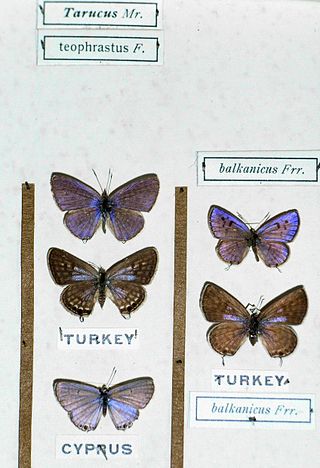
Tarucus theophrastus, the common tiger blue, pointed Pierrot or African Pierrot, is a small butterfly found in the Old World tropics. It belongs to the lycaenids or blues family.

Euchrysops cnejus, the gram blue, is a small butterfly that belongs to the lycaenids or blues family. It is found from India to Australia. The species was first described by Johan Christian Fabricius in 1798.

Jamides bochus, the dark cerulean, is a small butterfly found in Indomalayan realm that belongs to the lycaenids or blues family. The species was first described by Caspar Stoll in 1782.

Jamides celeno, the common cerulean, is a small butterfly found in Indomalayan realm belonging to the lycaenids or blues family. The species was first described by Pieter Cramer in 1775.

Freyeria trochylus, the grass jewel, is a small butterfly found in Africa, Arabia, southern Europe, India and southern Asia that belongs to the lycaenids or blues family.

Kaniska canace, the blue admiral, is a nymphalid butterfly, the only species of the genus Kaniska. It is found in south and southeast Asia.
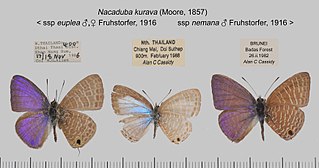
Nacaduba kurava, the transparent six-line blue, is a species of butterfly in the family Lycaenidae found in Asia and Australia. The species was first described by Frederic Moore in 1857.

Catochrysops strabo, the forget-me-not, is a small butterfly found in Asia that belongs to the lycaenids or blues family. The species was first described by Johan Christian Fabricius in 1793. It is found in Sri Lanka, India, from Sikkim to Indochina and in Sundaland, Sulawesi and the Philippines.

Cosmopterix diaphora is a moth of the family Cosmopterigidae. It is known from the Federal District of Brazil and the states of Guerrero and Veracruz in Mexico.

Cosmopterix ebriola is a moth of the family Cosmopterigidae. It is known from the United States and the Cayman Islands.
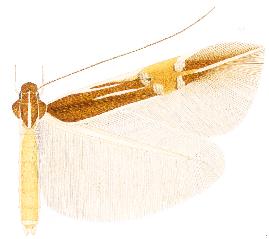
Cosmopterix erinome is a moth of the family Cosmopterigidae. It is known from the United States.

Cosmopterix galapagosensis is a moth of the family Cosmopterigidae. It is known from the Galapagos Islands.
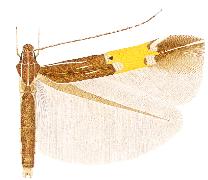
Cosmopterix magophila is a moth of the family Cosmopterigidae. It is known from the United States and the Dominican Republic.

Cosmopterix orthosie is a moth of the family Cosmopterigidae. It is known from Minas Gerais, Brazil.

Cosmopterix pentachorda is a moth of the family Cosmopterigidae. It is known from Ecuador and Peru.
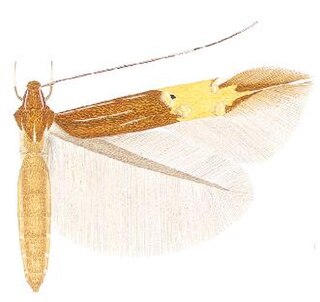
Pebobs tetragramma is a moth of the family Cosmopterigidae. It is known from Guyana.
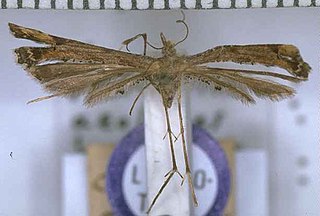
Amblyptilia aeolodes is a moth of the family Pterophoridae. This species was first described by Edward Meyrick in 1902. It is endemic to New Zealand and is found on the Chatham Islands, Big South Cape Island, and the subantarctic Auckland and Campbell Islands.The larvae feed on dicotyledonous herbs.

Blera pictipes, the painted wood fly, is a rare species of syrphid fly first officially described by Bigot in 1883. Hoverflies get their names from the ability to remain nearly motionless while in flight. The adults are also known as flower flies for they are commonly found around and on flowers, from which they get both energy-giving nectar and protein-rich pollen. The larvae are of the rat-tailed type, feeding on exuding sap or in the rot holes of trees.
Anthrenus (Florilinus) kompantzevi is a little known species of carpet beetle in the family Dermestidae native to Kyrgyzstan. Species have been noted from southwest part of Kyrgyzstan to the Kyrgyz Ala-Too mountain range near canyons of Kara Balta river.











